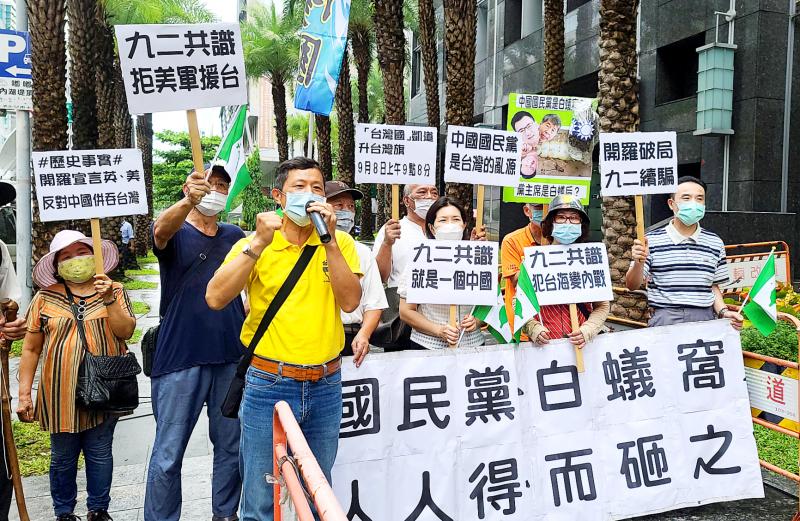Taiwan independence advocates protested in Taipei yesterday, accusing leading Chinese Nationalist Party (KMT) members of collaborating with China to destroy Taiwan from within.
Led by the Taiwan Republic Office group, protesters carried placards and shouted slogans outside the TVBS Media building in Neihu District (內湖), where the four candidates competing in the election for KMT chairperson were attending a televised policy debate yesterday afternoon.
Taiwan Republic Office director Chilly Chen (陳峻涵) criticized top KMT officials for “hanging on to the myth” of the so-called “1992 consensus” and the “one China” concept.

Photo: Fang Pin-chao, Taipei Times
He compared the KMT to a large termite nest, with the four candidates for chairperson competing to become the “termite queen.”
“All top figures in the KMT hold pro-China views, pandering to the Beijing government’s interests. Their ... words and actions are designed to tear apart Taiwan’s social cohesion and subvert our national unity,” Chen said.
Taiwan Republic Office member Lai Fu-jung (賴富榮) said that KMT members are like termites because they are eating away at the national and cultural identities of Taiwanese, which has serious consequences for the armed forces and their duty to safeguard Taiwan’s national sovereignty.
The protesters shouted slogans as each of the four KMT candidates arrived, namely incumbent KMT Chairman Johnny Chiang (江啟臣), former New Taipei City mayor Eric Chu (朱立倫), former Changhua County commissioner Cho Po-yuan (卓伯源) and Sun Yat-sen School president Chang Ya-chung (張亞中).
Chang created a minor disturbance when he stopped to respond to the protesters, giving a thumbs-down sign. Police officers moved quickly to prevent a confrontation between the two groups.
The so-called “1992 consensus,” a term former Mainland Affairs Council chairman Su Chi (蘇起) in 2006 admitted making up in 2000, refers to a tacit understanding between the KMT and the Chinese government that both sides of the Taiwan Strait acknowledge there is “one China,” with each side having its own interpretation of what “China” means.

The Grand Hotel Taipei on Saturday confirmed that its information system had been illegally accessed and expressed its deepest apologies for the concern it has caused its customers, adding that the issue is being investigated by the Ministry of Justice Investigation Bureau. The hotel said that on Tuesday last week, it had discovered an external illegal intrusion into its information system. An initial digital forensic investigation confirmed that parts of the system had been accessed, it said, adding that the possibility that some customer data were stolen and leaked could not be ruled out. The actual scope and content of the affected data

DO THEY BITE IT? Cats have better memories than people might think, but their motivation is based entirely around the chance of getting fed Cats can remember the identity of the people who fed them the day before, Taipei-based veterinarians said on Friday, debunking a popular myth that cats have a short memory. If a stray does not recognize the person who fed them the previous day, it is likely because they are not carrying food and the cat has no reason to recognize them, said Wu Chou Animal Hospital head Chen Chen-huan (陳震寰). “When cats come to a human bearing food, it is coming for the food, not the person,” he said. “The food is the key.” Since the cat’s attention is on the food, it

‘LIKE-MINDED PARTNER’: Tako van Popta said it would be inappropriate to delay signing the deal with Taiwan because of China, adding he would promote the issue Canadian senators have stressed Taiwan’s importance for international trade and expressed enthusiasm for ensuring the Taiwan-Canada trade cooperation framework agreement is implemented this year. Representative to Canada Harry Tseng (曾厚仁) in an interview with the Central News Agency (CNA) said he was increasingly uneasy about Ottawa’s delays in signing the agreement, especially as Ottawa has warmed toward Beijing. There are “no negotiations left. Not only [is it] initialed, we have three versions of the text ready: English, French and Mandarin,” Tseng said. “That tells you how close we are to the final signature.” Tseng said that he hoped Canadian Prime Minister Mark Carney

President William Lai (賴清德) yesterday bestowed one of Taiwan’s highest honors on Saint Vincent and the Grenadines (SVG) Ambassador Andrea Clare Bowman in recognition of her contributions to bilateral ties. “By conferring the Order of Brilliant Star with Grand Cordon on Ambassador Bowman today, I want to sincerely thank her, on behalf of the Taiwanese people, for her outstanding contribution to deepening diplomatic ties between Taiwan and SVG,” Lai said at a ceremony held at the Presidential Office in Taipei. He noted that Bowman became SVG’s first ambassador to Taiwan in 2019 and